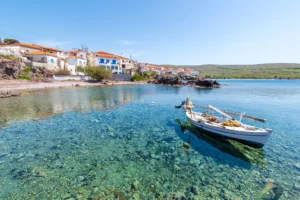March 30 – April 6, 2024
Lesbos Island, Greece
www.yogaholiday.it
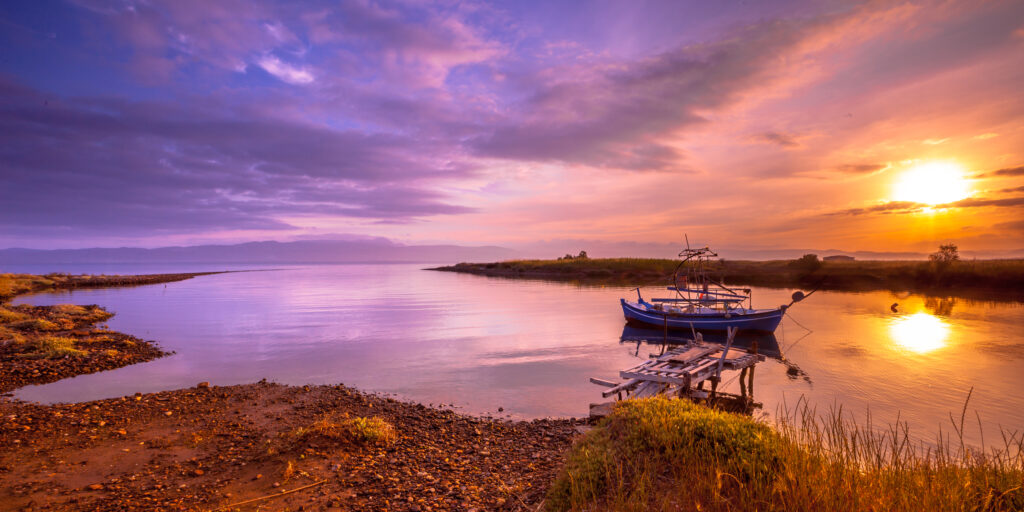
The reference to the four elements (air, water, earth, and fire) is common to all cosmogonies. Both the East and the West have conceived a close connection between the human microcosm and the natural macrocosm. The balance of the elements determined the life of the human species and the survival of the cosmos: the ordered universe, arising from chaos, was governed by deified personifications of the four elements.
“One of the seven sages, Thales of Miletus, pointed to water as the principle of everything, Heraclitus to fire, the Magi Priests to water and fire, Euripides […] to air and earth. Pythagoras indeed, Empedocles, Epicarmus, and other philosophers of nature maintained that the primordial elements are four: air, fire, earth, water.”
(Vitruvius, De architectura, book VIII, preface)
While in the Hellenic tradition there are four elements: fire, earth, air, and water, in the Indian tradition, found in the main philosophical schools linked to Hinduism, there are five elements: earth, water, fire, air, and ether.
The Panchamahabuta (the five elements) are an integral part of our life, yet we seem to be unaware of it. Panchamahabhuta is a Sanskrit word composed of three words: Pancha, Maha, and Bhuta, where Pancha means five, Maha means great or noble, and Bhuta means having one’s existence. Bhuta, in itself, is not generated by others but causes the generation of Mahabhuta.
During this week-long retreat, we will discover how the elements, albeit unconsciously, govern our existence, being fundamental substances of all animated and inanimate matter in this part of the universe.
Yoga teaches us that every human being is an integral part of the universe. Being in harmony with these essential components makes our life richer and more harmonious, providing greater integration among all aspects of our existence, protecting and promoting our health.
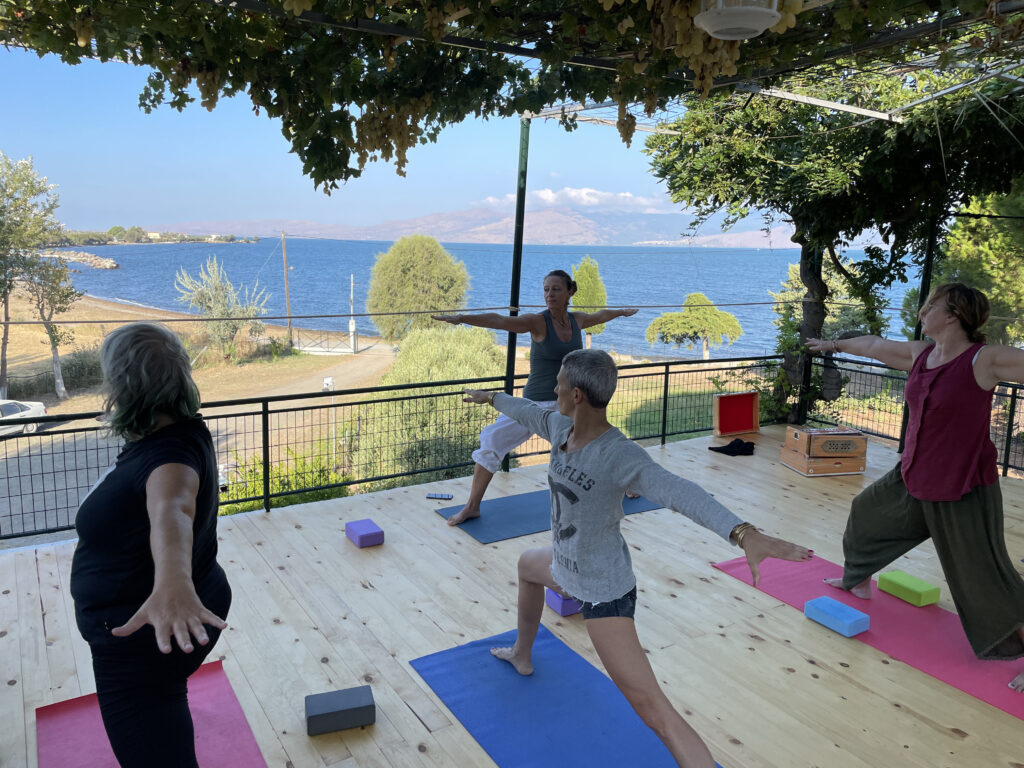
Program
Introduction, The five elements in yoga.
• The philosophy of Samkya, the five elements, and the importance of seeking balance.
• Various rebalancing practices in yoga: asanas, deep relaxation and Sankalpa, mantras, pranayama, mudras.
• Earth: perception of the earth element, mantras for the earth, asanas, relaxation, pranayama, and mudras for the earth element.
• Water: perception of the water element, asana sequence, water relaxation, pranayama, and mudras for the water element, mantras for the water element.
• Fire: perception of the fire element, asana sequence, fire relaxation, pranayama, and mudras for the fire element, mantras for the fire element.
• Air: perception of the air element, mantras for the air, air relaxation, pranayama, and mudras for the air element.
• Ether: perception of the ether element, mantras for ether, asana sequence, ether relaxation, pranayama, and mudras for the ether element.
DAILY PROGRAM
08:00 – 9:30 Asana practice, pranayama for each element
9:30 – 10:30 Breakfast
10:30 – 12:30 Mahabhuta theory
12:30 – 13:00 Mantra, kirtan
14:30 Visit to the most characteristic places on the island (fossil forest, beaches, characteristic villages, castles, monasteries, and thermal baths)
During the week, two afternoons will be dedicated to practicing the elements shown and learned during the lessons.
COST
The cost per person in a double room with a bathroom is €550 (the cost includes accommodation, three meals a day, course materials, transportation to and from the airport, guided tours).
REGISTRATION: To register, a deposit of €200 is required (contact for registration details).
LOCATION Latitude: 39.145934 Longitude: 26.250718
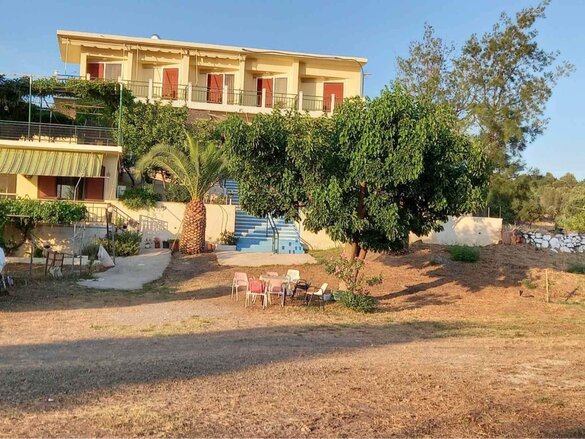
The building, which has now been completely converted into a yoga center and study of energy and healing practices, was originally a traditional Greek tavern and a small hotel. The structure, overlooking the Gulf of Kalloni (the sea is a few meters from the house), is completely isolated and immersed in a context of exceptional natural beauty. This area is a paradise for all birdwatching enthusiasts who come to the island, especially in the spring months, from all over the world to admire pink flamingos, white and black storks, peregrine falcons, and many other migratory birds of rare beauty. The gulf is an important breeding area for many fish species, making this stretch of sea teeming with life. Its location, the natural context in which it is located, the peace, silence, and the power of the elements make this place an ideal place to fully immerse yourself in the study and practice of various disciplines, leaving behind all the physical and emotional burdens that normally crowd our lives.
ACCOMMODATION TYPES
The center provides five rooms with bathrooms, and additionally, 800 meters away, we have five more rooms with bathrooms. We offer accommodation in double rooms with single beds and single rooms (with a surcharge).
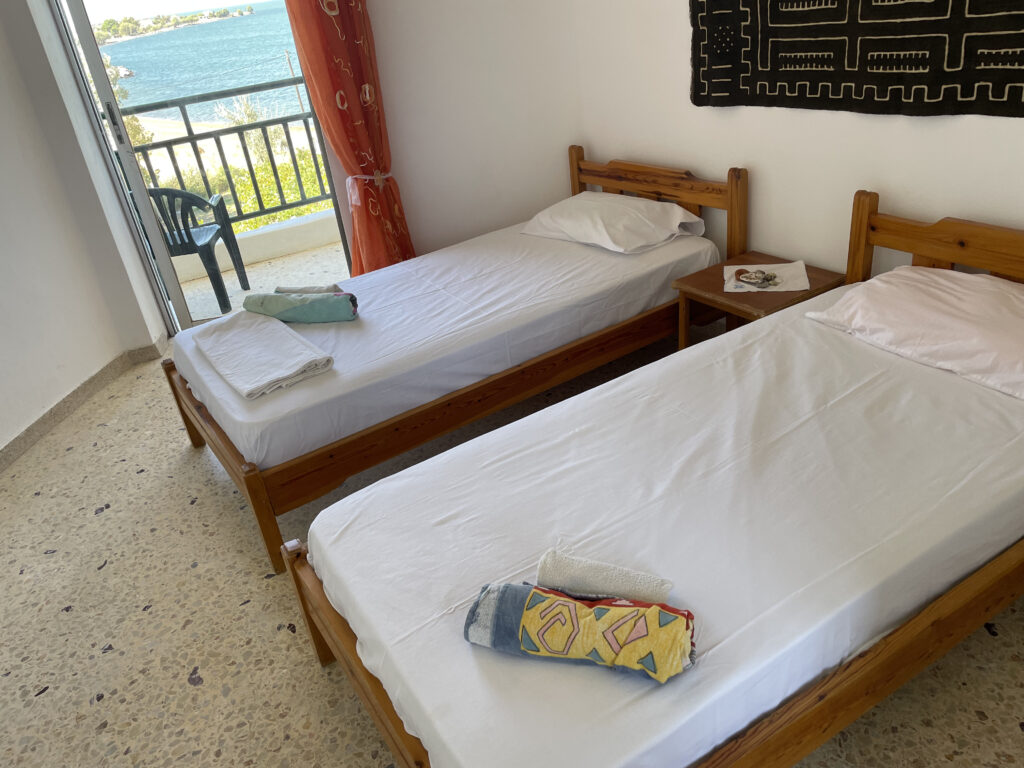
FOOD
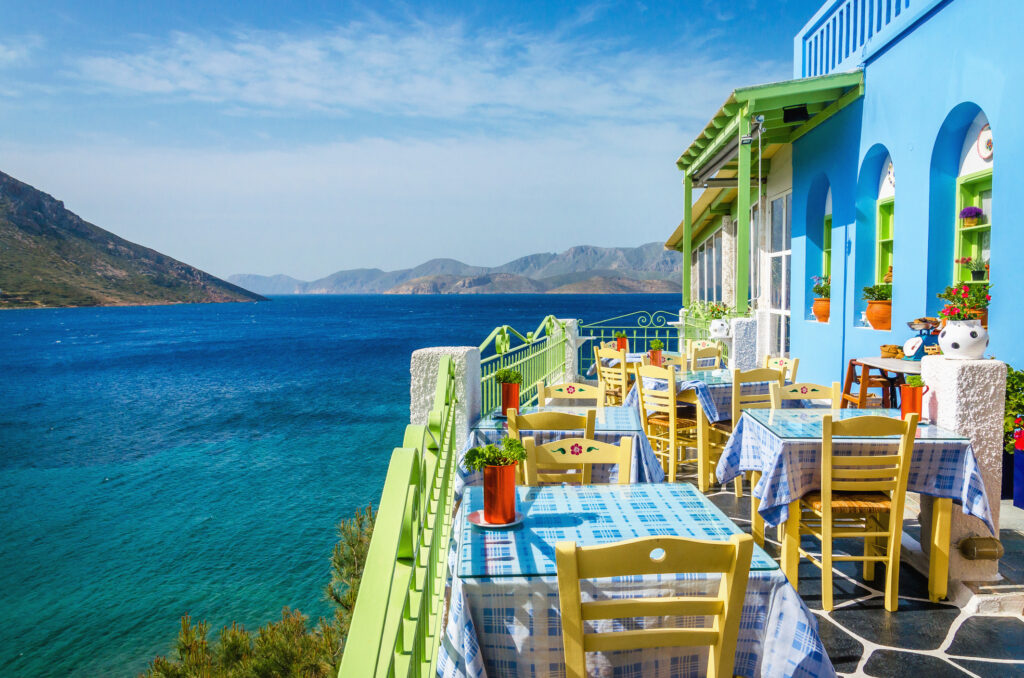
All meals are carefully prepared by our staff directly in the spacious kitchen available at the center. The raw materials and ingredients, all locally sourced, are of the highest quality because they are cultivated in a healthy, unpolluted environment, on volcanic and nutrient-rich soil. Meals include breakfast, lunch, and dinner. Throughout the day, abundant fruit from our garden, herbal teas, water, and various beverages are available. Meals are vegetarian/vegan with a strong Greek/Middle Eastern influence.
THE ISLAND
Despite being a UNESCO World Heritage site, this island does not have tourist traffic comparable to other Greek islands such as Santorini, Mykonos, or Rhodes. Lesvos is nevertheless a generous and independent island, with its own well-defined profile in the Greek economy and full of interesting things to discover and, of course, enjoy. It is the homeland of Sappho (a famous poetess of the classical period), the best Greek olive oil, the undisputed capital of ouzo, retsina (local flavored wine), boasts a curious and unique petrified forest, and its capital, Mytilene, is rich in historical remains and has a lively student life that animates it even during the long winter months. The island’s nature is lush and generous: millions of olive trees alternate with dense forests but also leave room for desolate valleys and barren mountains. And then there is the endless coast, for long stretches unknown to mass tourism, lonely but welcoming, familiar only to the nearly 300 species of migratory birds that choose to stop here every year. Lesvos is an island where Greek daily life is not dazzled by easy and somewhat kitschy money from vulgar and naive tourism. It lives its routine with optimism and appreciates the fact that those who come here have not chosen their destination randomly.
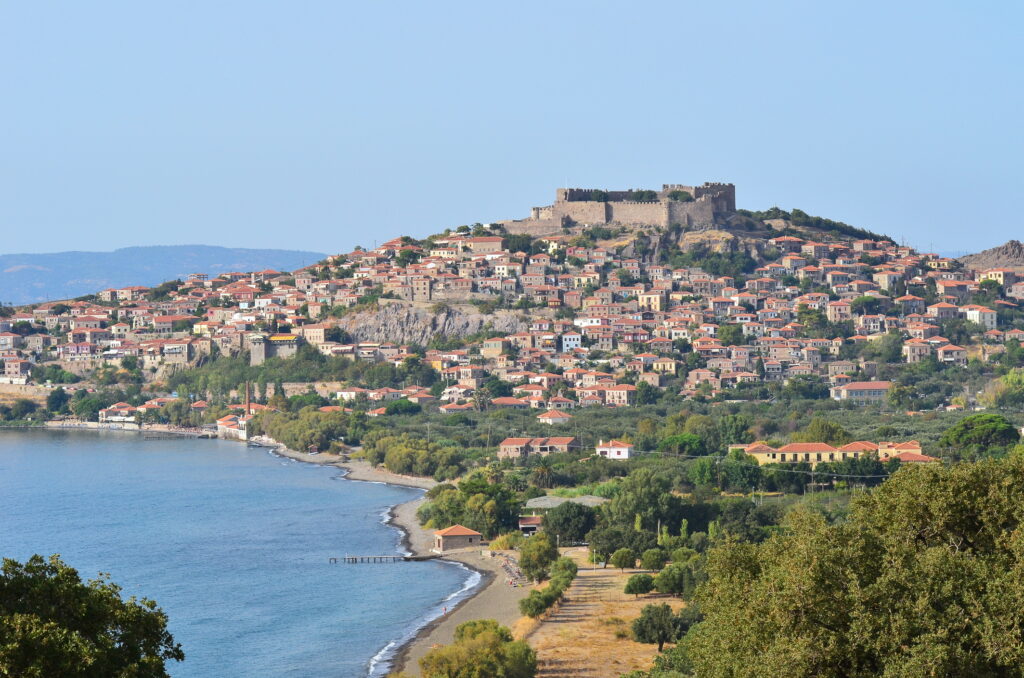

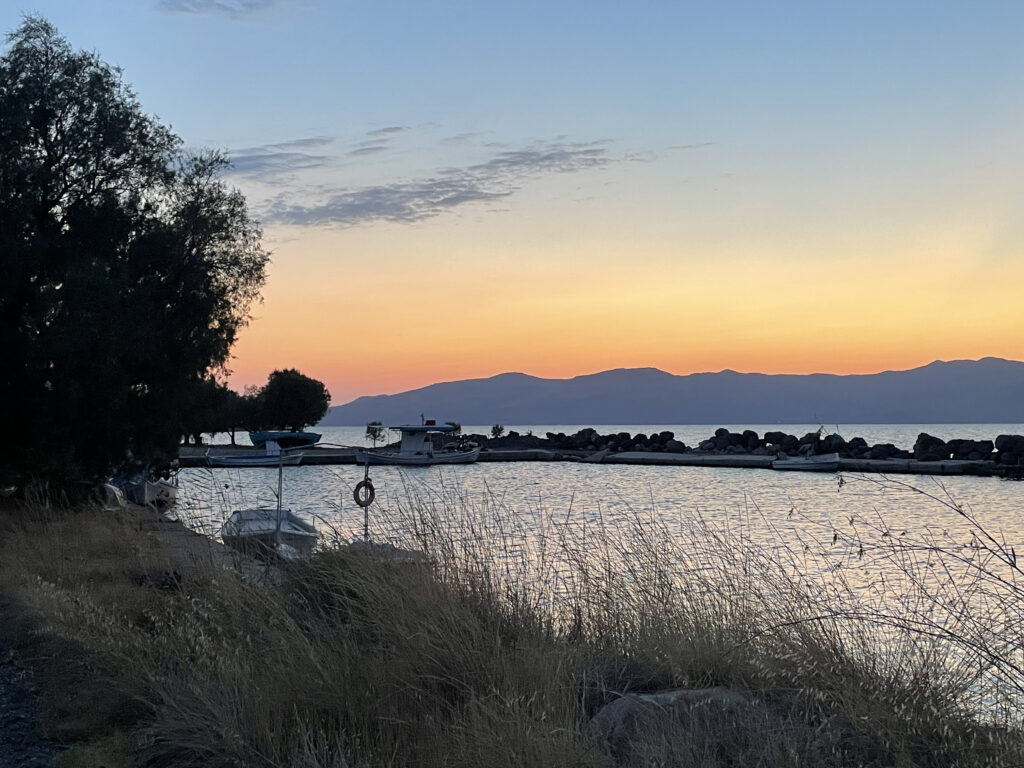
HOW TO GET THERE
Lesvos is located in the northeastern Aegean Islands and is the largest in the group by size. Due to its importance, it has very easy connections with Athens, where there are various domestic flights every day throughout the year. If you want to save, there are good ferry connections, always every day of the year. Ferries also stop in Chios and often extend north to Thessaloniki. From some European countries, it is possible to fly directly to Lesvos, which has a small but modern international airport. If you cannot find a direct flight to Mytilene, fly to Athens and then take another flight to the island.
BEACHES
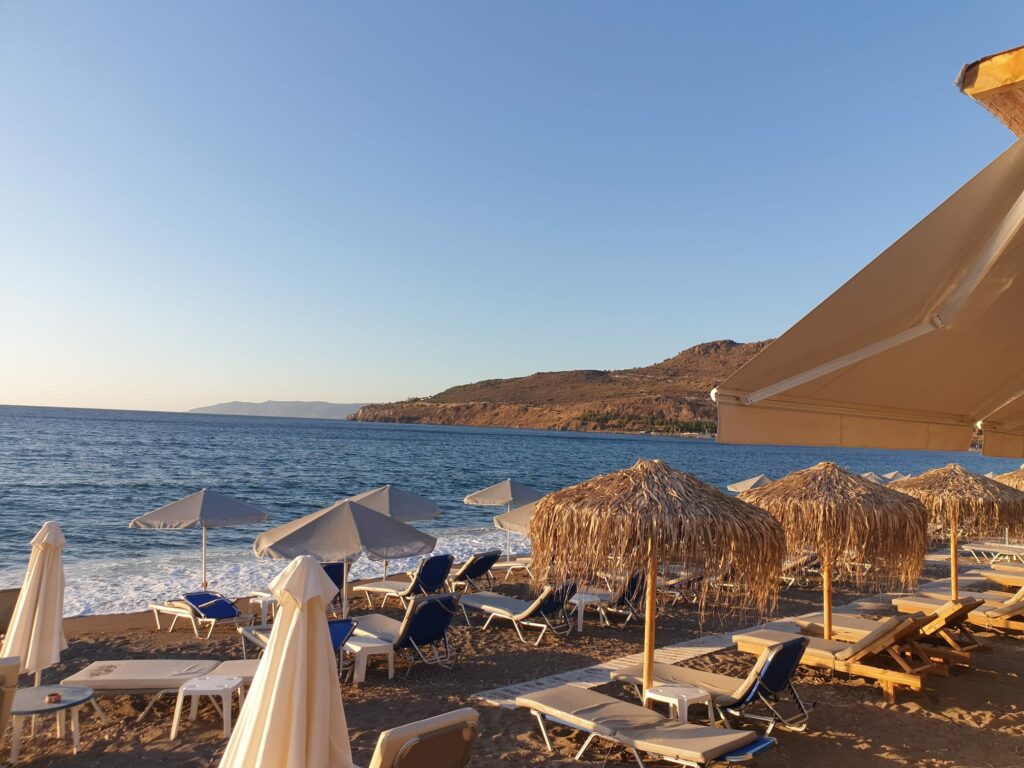
Like traditional villages, Lesvos has numerous, practically infinite, beaches. From kilometers of sandy and pebble beaches to quiet coves, the choice is only embarrassing. The most famous are essentially four, all very distant from each other in terms of surface. To the south, around the village of Plomari, is Agios Isidoros; to the north, just below Molyvos, is Petra. The most famous beach on the western part of Lesvos is Skala Eressous, while along the same coast, but on the opposite side, is the beach of Vatera. All very extensive and all with ample space to relax without crowds even in the middle of August.
THINGS TO SEE
In Lesvos, needless to say, there is a lot to see and do. To see everything, you have to stay on the island for a long time, at least ten days, or come back several times, and we are sure that the island will tempt anyone with this desire. Some of the best attractions are the hot spring of Polichnitos, the petrified forest. Other things to see in Lesvos are the monasteries of Limonos and Taxiarchis, the Roman aqueduct, and the castle of Mytilene.
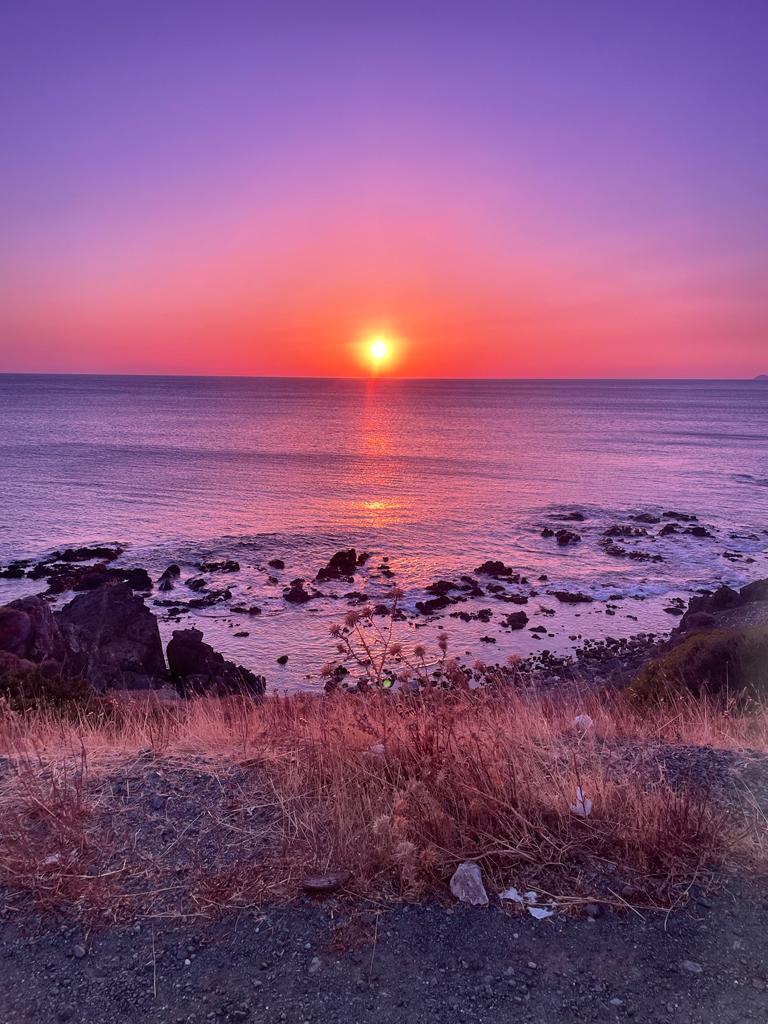
TEACHERS
Massimo Cantara: He graduated as a Yoga teacher (500h) with the international school SYM, where he also taught, and obtained a diploma in Yoga Therapy (300h) with Vasistha Yoga Foundation in Kerala, India. Since 2010, he has been teaching at his own center in Italy and is a founding member of “Three Treasures Yoga,” an International teacher training school. In addition to his professional activity as an operator in Bio-Natural Disciplines and as a Shiatsu teacher, in 1999 he founded the Holismos Center for health, a center for the spread and practice of Bio-Natural disciplines, including Yoga, of which he is the director. In 2016, together with Sara Della Torre, he founded the Holismos Yoga and Wellness Center in Varese. Diploma in Cranio Sacral Balance, Kinesiologist, Shiatsu Operator, Yoga Teacher. In 2020, he debuted with his musical CD “Elemental World,” a sound journey through the 5 elements. In 2021, he published his book “Hospital without Pain” Bio-Natural disciplines in the hospital context Ed. Epigraphia, Salus series.
Sara Della Torre: Yoga teacher (200hYAI), Shiatsu practitioner, co-director of the Holismos Yoga & Wellness center. She studied Yoga in Italy and India with various international teachers, a diploma in Mindfulness facilitator. Sara has a Master’s in Yoga Education for teaching yoga in schools, a diploma in Restorative yoga, and has attended a course in Ayurvedic nutrition.
CONTACTS
Cell. 0039 3383824280 – 0039 3470478001 E-mail: info@holismos.com
Web: www.yogaholiday.it www.holismos.com


